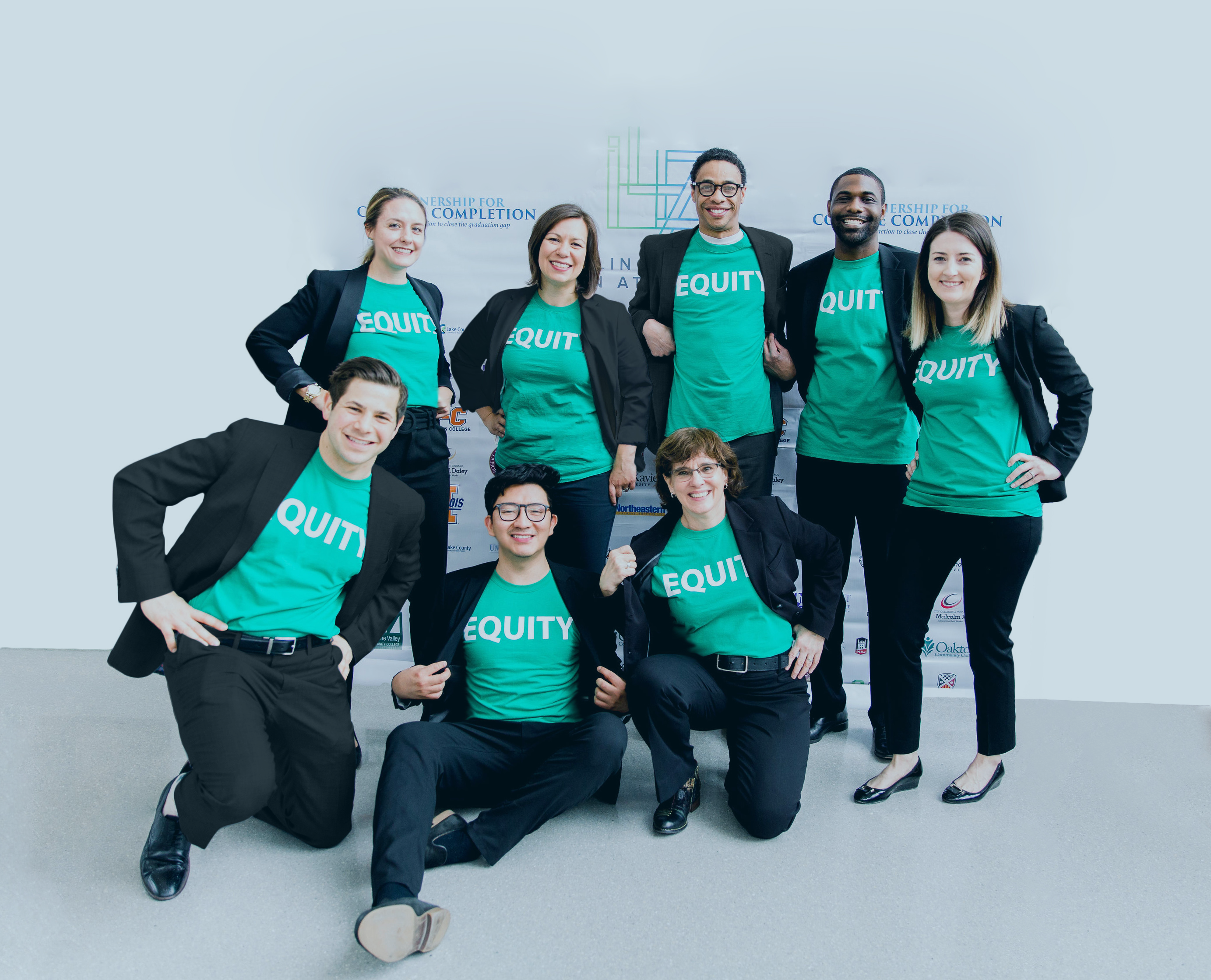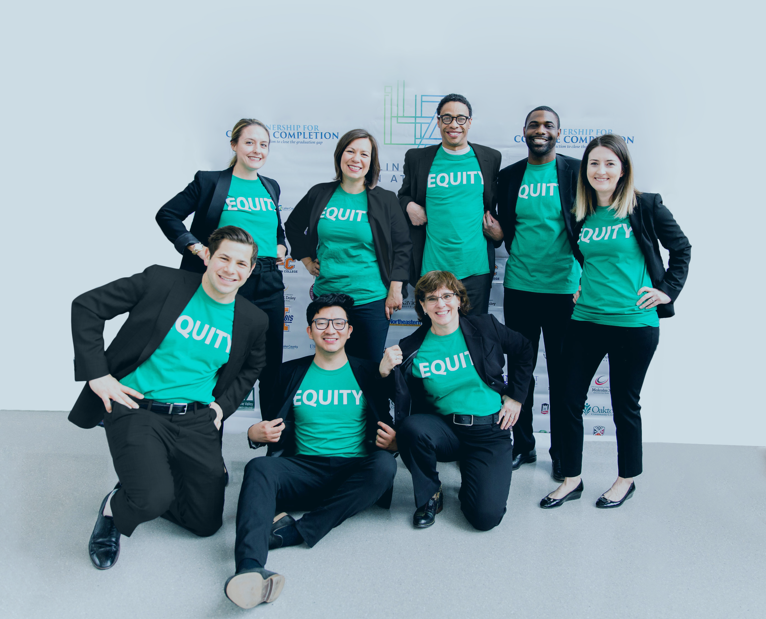28 Institutions Unite to Close Equity Gap in Degree Completion in Greater Chicago
Program Spotlight: Partnership for College Completion
August 21, 2020


Partnership for College Completion team shows off their commitment to equity at a 2019 summit.
“If you build it, they will come.” This idea not only worked well for Kevin Costner’s character in the movie Field of Dreams, it’s proving highly successful for the Partnership for College Completion (PCC).
PCC’s regionally-focused Illinois Equity in Attainment (ILEA) initiative has attracted a larger-than-expected cohort of institutions focused on a common goal: closing the racial and socioeconomic equity gaps in degree completion in the Chicago area by 2025.
“When PCC launched ILEA in Fall 2018, we hoped to attract 15 diverse colleges and universities who are equally concerned about these long-standing issues and wanted to work together to address them with urgency,” said Lisa Castillo Richmond, managing director, PCC. “The response was so strong, we nearly doubled our goal—attracting 28 committed institutions. Seeing this level of enthusiasm, commitment and support was so inspiring.”
The ILEA cohort is comprised of 11 four-year universities, including DePaul University and Northern Illinois University, and 17 community colleges, including Joliet Junior College and all seven City Colleges of Chicago.
Together, these institutions collectively serve 40% of all undergraduate enrollment in the state—nearly 42% of all enrolled African American undergraduate students and nearly 68% of all Latinx undergraduate students.
Even amid the COVID-19 pandemic, which upturned higher education overnight, the ILEA colleges and universities are on their way to achieving positive results. Over the last year, guided by direct support from PCC, each institution created a campus-level equity plan—a customized roadmap containing specific targets for student success and to increase college completion rates, particularly for low-income and first-generation college students.
The pandemic delayed the finalization and release of these plans, but Lisa said the crisis underscored the urgent need to prioritize equitable approaches. “If anything during this time, colleges and universities have realized that their equity work is more important than ever.”
This spring, ILEA institutions shifted resources and supports to some of their most vulnerable students because they understood how existing inequities were further exacerbated by the pandemic. The equity plans were released in August 2020, and institutions will move into implementation this fall. Several innovative strategies include:
- One community college will add student wrap-around services, including a food pantry, a new Math Success Center, and a faculty-led retention project designed to eliminate graduation disparities for Black, Latinx and Pell-receipt students.
- Another community college expects to see significant impact through a new first-year student experience program and the hiring of coaches to support student onboarding persistence in their first year. It will also adopt new hiring practices to attract and retain diverse faculty to better reflect the community it serves.
- One four-year university will expand academic support for English Language Learners and peer mentoring for students of color, while implementing new initiatives for African-American, Latinx and low-income students. It will also increase wrap-around support for low-income students, including access to mental health counseling, connections to legal and social services, and resources to address housing and food insecurities.
With support from ECMC Foundation, PCC will advance its work to implement key components of the ILEA initiative. This work includes a full gamut of activities, from very high-touch tactics to low-touch and scalable ones.
For example, on the low-touch side, PCC offers an ongoing webinar series, delivered monthly, to share national evidence-based best practices for addressing gaps in equity or overall student success on campus. Once the pandemic hit, PCC added programming, including webinars and virtual meetings, new regularly updated resource pages, and a new newsletter that went out weekly during April and May with information.
PCC’s high-touch activities include semi-annual summits—full-day events attended by each institution’s each institutional team composed of faculty, department chairs and college presidents. Through speakers and workshops, these learning opportunities are meant to drive collaboration and shared learning across ILEA institutions. These events will be virtual throughout 2020, which offers a rare silver lining during the pandemic: being able to serve far more people, specifically faculty, from partner institutions at PCC events. Presentations can also be recorded and repackaged to be made more modular, giving ILEA more flexibility to reuse and share important content.
On the deepest level of support, PCC just launched our first Equity Academy, specialized professional learning opportunities for college presidents and faculty. These include a series of conferences, seminars and webinars, in which participants are required to commit to one full year of continuous engagement. Funded in part by ECMC Foundation, the Equity Academies will teach ILEA institution members a set of skills that will directly contribute to creating equitable outcomes on their campuses. The first Equity Academy for Presidents and their Cabinets, in partnership with the Aspen Institute, kicked off a year-long series of workshop with eleven ILEA teams in late July 2020.
“As challenging as this year will be, we do see innovation and creativity in student supports emerging in many places that would generally have taken years to develop and implement,” said Lisa.
She adds, “We’re excited to help these institutions close long-standing racial and socioeconomic equity gaps—and work together to establish northeastern Illinois as a national leader in equity in degree completion.”
